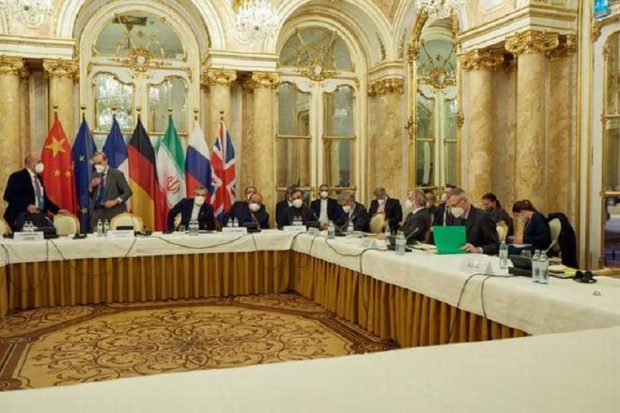
Iran strikes hard line as talks over nuclear deal resume
PTI, Dec 1, 2021, 8:18 AM IST

Image credit: Reuters
Tehran: Iran struck a hard line Tuesday after just one day of restarted talks in Vienna over its tattered nuclear deal, suggesting everything discussed in previous rounds of diplomacy could be renegotiated.
Speaking to Iranian state television, Ali Bagheri, Iran’s top nuclear negotiator, referring to everything discussed thus far as merely a “draft.” It remained unclear whether that represented an opening gambit by Iran’s new president or signaled serious trouble for those hoping to restore the 2015 deal that saw Tehran strictly limit its enrichment of uranium in exchange for the lifting of economic sanctions.
The United States left the deal under then-President Donald Trump’s “maximum pressure” campaign against Tehran in 2018. Since the deal’s collapse, Iran now enriches small amounts of uranium up to 60% purity — a short step from weapons-grade levels of 90%. Iran also spins advanced centrifuges barred by the accord, and its uranium stockpile now far exceeds the accord’s limits.
President Joe Biden has said America’s willing to re-enter the deal, though the negotiations continue with U.S. officials not in the room as in previous rounds of talks since Washington’s withdrawal.
“Drafts are subject to negotiation. Therefore nothing is agreed on unless everything has been agreed on,” Bagheri said. ”On that basis, all discussions that took place in the six rounds are summarized and are subject to negotiations. This was admitted by all parties in today’s meeting as well.”
That directly contradicted comments Monday by the European Union diplomat leading the talks. “The Iranian delegation represents a new administration in Tehran with new understandable political sensibilities, but they have accepted that the work done over the six first rounds is a good basis to build our work ahead, so no point in going back,” Enrique Mora said.
Another state TV segment saw Bagheri in Vienna saying Iran demanded a “guarantee by America not to impose new sanctions” or not re-impose previously lifted sanctions. Mohammed Eslami, the country’s civilian nuclear chief, reiterated that demand in comments to Iran’s state-run IRNA news agency.
“The talks (in Vienna) are about the return of the U.S. to the deal and they have to lift all sanctions and this should be in practice and verifiable,” he said. He did not elaborate.
The U.S. has imposed a slew of sanctions on Iran since the 1979 takeover of the U.S. Embassy in Tehran. Some eventually directly dealt with the country’s nuclear program, while others targeted Tehran for what Washington describes as destabilizing actions in the Mideast. Under the 2015 nuclear deal, the U.S. lifted nuclear sanctions, which returned when Washington pulled out of the accord.
Iran maintains its atomic program is peaceful. However, U.S. intelligence agencies and international inspectors say Iran had an organized nuclear weapons program up until 2003. Nonproliferation experts fear any brinkmanship could push Tehran toward even more extreme measures to try to force the West to lift sanctions.
Making matters more difficult, United Nations nuclear inspectors remain unable to fully monitor Iran’s program after Tehran limited their access. A trip to Iran last week by the head of the International Atomic Energy Agency, Rafael Grossi, failed to make any progress on that issue.
Talks in Vienna aimed at re-imposing curbs on Iran’s nuclear program resumed Monday after a more than five-month hiatus as hard-line President Ebrahim Raisi took power. Raisi, a protégé of Supreme Leader Ayatollah Ali Khamenei, campaigned on getting sanctions lifted. However, fellow hard-liners within Iran’s theocracy long have criticized the nuclear deal as giving too much away to the West.
Mikhail Ulyanov, Russia’s top representative to the talks, tweeted Tuesday that the resumption of negotiations was “quite successful.” “Participants decided to continue without delay the drafting process in two working groups — on sanctions lifting and nuclear issues,” he wrote. ”This work starts immediately.”
Israel, Iran’s regional, nuclear-armed rival, kept up its own pressure amid the negotiations. Israeli Prime Minister Naftali Bennett, in a video address delivered to nations negotiating in Vienna, warned that he saw Iran trying to “end sanctions in exchange for almost nothing.”
“Iran deserves no rewards, no bargain deals, and no sanctions relief in return for their brutality,” Bennett said in the video that he later posted to Twitter. “I call upon our allies around the world: Do not give in to Iran’s nuclear blackmail.”
Udayavani is now on Telegram. Click here to join our channel and stay updated with the latest news.
Top News

Related Articles More

Indian-American doctor who kept two Indians as servants on low pay loses medical license

Trump says he will use ‘economic force’ against Canada

6.8-magnitude quake in Tibet kills 126 people, tremors felt in Nepal

Minor sisters burn father alive over alleged sexual abuse

China shuts down Mt Everest scenic area after 6.8-magnitude quake hits Tibet
MUST WATCH
Latest Additions

Lokayukta arrests Hassan Municipal Commissioner, Bengaluru official in bribery cases

NHRC notice to Centre, K’taka govt over ‘suicide’ by old man over hospital ‘denying’ scheme benefit

K’taka BJP leader slams Maoist surrender as ‘farce,’ accuses CM of embracing Maoist ideology

Postman injured in Bus-Bike collision near Aadidhan hotel near Mulki

K’taka BJP leader slams Maoist surrender as ‘farce,’ accuses CM of embracing Maoist ideology
Thanks for visiting Udayavani
You seem to have an Ad Blocker on.
To continue reading, please turn it off or whitelist Udayavani.



















